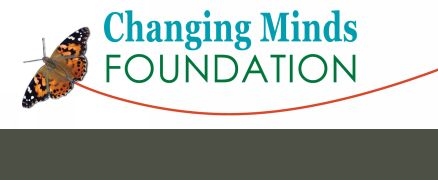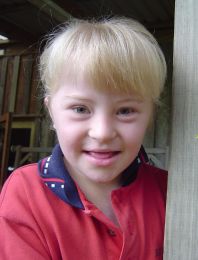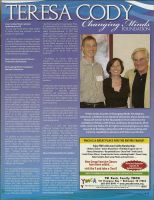
News
Channel 4 News --United Kingdom
People with Down syndrome are living longer than ever before. Since the 1980's their life expectancy has doubled and many now live into their 60's.
But for the estimated 60,000 people with Down syndrome in the UK, this development is coupled with the startling knowledge that people with Down's are significantly more at risk of developing dementia than the rest of us. Not only that, but they also develop it at a much younger age - 30 to 40 years earlier than the general population.
February 25, 2007
Drug May Counteract Down Syndrome
Formerly approved drug imparts lasting learning and memory improvements to impaired mice
By JR Minkel

DOWN SYNDROME DRUG? Low doses of three different chemicals counteracted Down syndrome-like learning and memory problems in mice.
© GRACE/ZEFA/CORBIS
Researchers may have finally found a drug candidate for reducing the mental retardation caused by Down syndrome, which afflicts more than 350,000 people in the U.S. Researchers gave low doses of a human drug to mice bred to mimic the learning and memory problems in people with Down syndrome. After as little as two weeks, the impaired mice performed as well as normal ones in learning tests, and the improvement lasted for up to two months after treatment ended.
But there is a catch: the drug was taken off the market 25 years ago after being found to cause dangerous seizures in some people. And many compounds that boost learning in mice fail in human trials.
Nevertheless, "anyone studying Down's is going to have their socks blown off by this," says geneticist Roger Reeves, a Down syndrome specialist at the Johns Hopkins School of Medicine in Baltimore, who was not involved in the study. "There hasn't been anything out there that we really could take to patients or that we had a strong possibility of taking into the clinic."
Researchers tested the drug, pentylenetetrazole (PTZ), as well as two other compounds—picrotoxin and a gingko biloba extract called bilobalide—because they all interfere with tiny ion channels on brain cells (neurons). When activated, the channels, known as GABAA receptors, inhibit the cells, making it harder for them to form new synapses, or connections, with neighboring neurons.
The deficits of Down syndrome may occur because the brain contains too many such inhibitory signals, says Stanford University neurobiologist Craig Garner, whose group performed the experiments. "In order to learn, you have to have a period during which synapses can get stronger or weaker," he says. "This changing is what's not possible when you have too much inhibition."
So Garner, his student Fabian Fernandez, and their colleagues gave their mice either low doses of PTZ mixed with milk, or low-dose injections of picrotoxin or bilobalide, daily for two to four weeks to slightly raise the level of excitation in the brain. Immediately after treatment, the animals' scores on two memory tests—for recognizing objects they had seen before or remembering how they last entered a maze—were on par with normal mice; two months later, they still did much better than they normally would, the researchers report in a paper appearing online February 25 in Nature Neuroscience.
The treatment "is allowing the normal properties of neurons to work," Garner says. "This slowly over time leads to an improved circuit."
Reeves says there may be other ways to treat Down syndrome, but "you can see your way to clinical testing most easily from here," because researchers identified specific chemicals. "It's hugely promising," he says. "Maybe it will have a big effect, but we don't know that." The inhibition model is plausible, but still unproved in people, he notes, and until researchers better understand the mechanisms by which the compounds work, "I'm wary of rushing into the clinic."
Garner says clinical trials of PTZ could begin in the next year or two, and evaluating them might take five to 10 years. He notes that although PTZ is nearly 100 years old and was used to treat psychiatric disorders and later dementia, researchers never concluded it was effective. It also caused seizures (at doses 100-fold higher than those given to the mice), so the FDA revoked its approval in 1982.
In Down syndrome, chromosome 21 is present in three copies instead of two. Similarly, the mice used in the study have a duplicated piece of chromosome 16. As in Down syndrome, these animals have malformed facial bones and problems forming new memories.
Reeves notes that many researchers have long considered Down syndrome too complex to crack, but the study "serves as notice to the neuroscience community that there are a lot of interesting things to do here. This is not some vague, mega complex issue."
Press Release April 2010 for Butterfly Flutter By Event in Fort Bend Focus magazine
News Article December 2009 'Not To Be Bound' Fort Bend Pecan Grove Monthly Magazine
News Article Nov. 19,2009 ''For Kids With Down syndrome, a 'Ray of Hope' '' US News and World Report
News Article Nov. 18,2009 'Mouse study points to treatment for Down syndrome' Reuters
News Article October 16, 2009 'A Lesson on Power of Positive Thinking' Herald Coaster
News Article May 1, 2009 'Mother's Making A Difference" Fort Bend Focus Magazine
News Article April 8, 2009 'A Mother's Love' Herald Coaster
News Article December 8, 2008 'Treatment Offers Ray of Hope' The Journal Gazette














